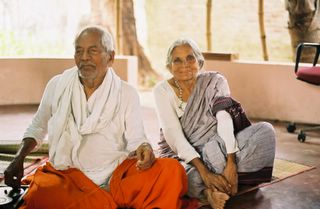Lord of the Six Directions
Muruga is the half-brother of Ganesh, the elephant-headed God. There are various traditions surrounding Muruga, who, it turns out, is much more popular in South India than in the North (where he is usually known as Kartikeya.) In South India, he is always depicted as having two wives (and Ganesh is a bachelor) – there are famous depictions of Muruga with his two wives on one of the temple towers at the Thanjavur Temple. In the North, Muruga is the bachelor, and Ganesh has two wives.
It’s pretty interesting that he has two wives for, you see, Muruga, who is also known as the Lord of Six Faces and the Six Directions (inside and out complementing the usual ones), is always depicted as an 11 or 12 year old, who rides around on a peacock carrying a spear. Muruga is the god of social justice, of fairness, of equity, and like an 11-year-old, is deeply offended when he sees injustice. He will upset the total social applecart, destroying what he needs to (he is, after all, a son of Shiva the destroyer) in order to make things right again. He is the god of the poor and of the dalits (the untouchables), though in Tamil Nadu, he is also popular as a vent for nationalist sentiments. He looks in the six directions, seeing what needs to be done to make amends for any unjust state of affairs.
Occasionally, I fall into a reverie regarding what might happen if our state and global institutions were ruled by Muruga. Having watched for years as projects funded by the World Bank here have destroyed communities, indigenous peoples, land, water, and air, all in the name of development and "free trade" (which is, of course, coerced trade, or for those at the bottom of the multinational foodchain, no trade at all), it would be tempting to set up an altar to Muruga in World Bank offices. It might result in some interesting decisions:
Since unhealthy people are unproductive people, loans will only made to countries that promote universal health care to all its citizens;
Since hungry folks cannot be said to engage in "free" trade, first priority goes to local food self-sufficiency;
Since the Bank intends to foster democracy, local communities have the right to decide for themselves on a democratic basis whether projects to be funded by loans are acceptable;
Free trade includes the right not to trade; certain goods can be declared by communities to be off-limits to trade. In India, cows used to be a symbol of this. There might have been profits to be made in beef for some. But the value of milk and manure might offset whatever short-term profits are to be found. Let’s bring back the ban on sales of any foodstuff that is white!
Since land, water, and air are not created by humans, they cannot be owned by humans.
Above all, all economic policies must be guided by a careful look at what might result in all six directions, starting with what happens inside.
Just a reverie, of course. Frankly, I am more keenly interested in Krishnammal’s meta-economics than in that of the World Bank. (Bhoomi says he carried around an essay I wrote in 1981 on meta-economics for a decade, sharing it with friends, and I don’t even remember what was in it!) But I think it is a matter of duty that we all take a little more interest in such matters, whether we like it or not.
Bhoomikumar takes us to the McDonald’s of India, one of a chain of vegetarian restaurants called Hotel Saravana. (In India, restaurants are called "hotels".) Aliyah and I order idiappam, also known as "hoppers" or string hoppers". These are quite popular in Sri Lanka and Kerala – little cakes of rice vermicelli eaten with extremely hot and spicy vegetable curry. We are very pleased!
We finish our gift shopping – both of us hate to shop, but we found a stall with the actual handicraft makers of Gujarati "katcheri" puppets. Aliyah buys a pair as potential mascots for her house at Smith, and I add one – playing some kind of Indian bagpipe -- for my office, to hang from my doorway to ward off evil visitors. We are already missing the magic of Kuthur, the human scale of everything, the adventure of not knowing what will turn up on our doorstep next.
I am not always sure what good we have accomplished on our visit. Over the 27 years of my visits, this is not a new thought. I used to complain to Bhoomikumar that I am not a doctor, or a well-digger, or an agricultural specialist, or the representative of any other guild or occupation that might serve some immediately useful purpose. Bhoomikumar caught me up short. "You are here like a good-luck charm, or an itinerant priest, and are here to witness. You are much more valuable that way. And what you contribute cannot be bought or sold, but is simply given as a gift. This makes it even more priceless."
I come away chastened, ready to roll up my sleeves and go to work. That is much of what this blog has been all about.


0 Comments:
Post a Comment
<< Home